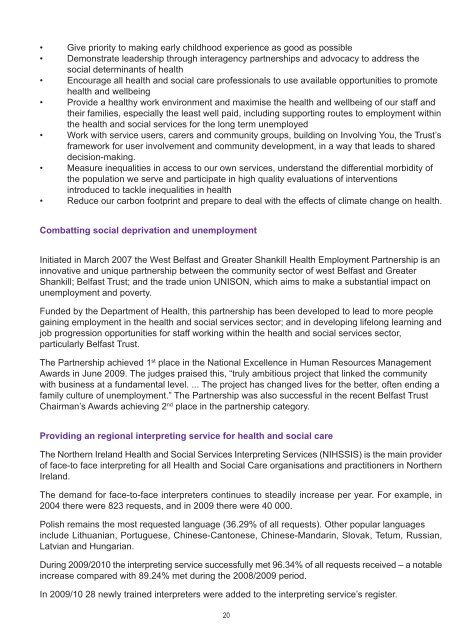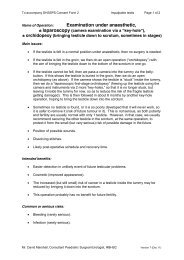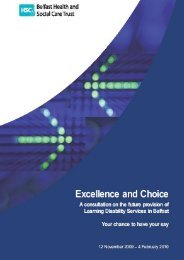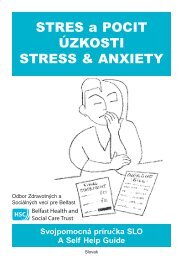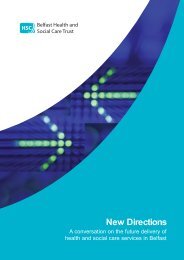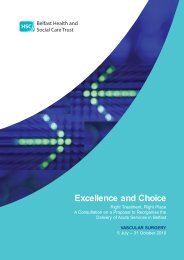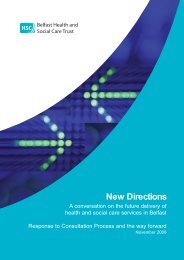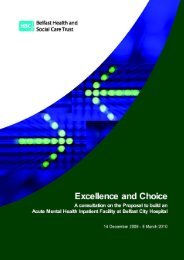Annual Report 2009 -2010 - Belfast Health and Social Care Trust
Annual Report 2009 -2010 - Belfast Health and Social Care Trust
Annual Report 2009 -2010 - Belfast Health and Social Care Trust
- No tags were found...
You also want an ePaper? Increase the reach of your titles
YUMPU automatically turns print PDFs into web optimized ePapers that Google loves.
• Give priority to making early childhood experience as good as possible• Demonstrate leadership through interagency partnerships <strong>and</strong> advocacy to address thesocial determinants of health• Encourage all health <strong>and</strong> social care professionals to use available opportunities to promotehealth <strong>and</strong> wellbeing• Provide a healthy work environment <strong>and</strong> maximise the health <strong>and</strong> wellbeing of our staff <strong>and</strong>their families, especially the least well paid, including supporting routes to employment withinthe health <strong>and</strong> social services for the long term unemployed• Work with service users, carers <strong>and</strong> community groups, building on Involving You, the <strong>Trust</strong>’sframework for user involvement <strong>and</strong> community development, in a way that leads to shareddecision-making.• Measure inequalities in access to our own services, underst<strong>and</strong> the differential morbidity ofthe population we serve <strong>and</strong> participate in high quality evaluations of interventionsintroduced to tackle inequalities in health• Reduce our carbon footprint <strong>and</strong> prepare to deal with the effects of climate change on health.Combatting social deprivation <strong>and</strong> unemploymentInitiated in March 2007 the West <strong>Belfast</strong> <strong>and</strong> Greater Shankill <strong>Health</strong> Employment Partnership is aninnovative <strong>and</strong> unique partnership between the community sector of west <strong>Belfast</strong> <strong>and</strong> GreaterShankill; <strong>Belfast</strong> <strong>Trust</strong>; <strong>and</strong> the trade union UNISON, which aims to make a substantial impact onunemployment <strong>and</strong> poverty.Funded by the Department of <strong>Health</strong>, this partnership has been developed to lead to more peoplegaining employment in the health <strong>and</strong> social services sector; <strong>and</strong> in developing lifelong learning <strong>and</strong>job progression opportunities for staff working within the health <strong>and</strong> social services sector,particularly <strong>Belfast</strong> <strong>Trust</strong>.The Partnership achieved 1 st place in the National Excellence in Human Resources ManagementAwards in June <strong>2009</strong>. The judges praised this, “truly ambitious project that linked the communitywith business at a fundamental level. ... The project has changed lives for the better, often ending afamily culture of unemployment.” The Partnership was also successful in the recent <strong>Belfast</strong> <strong>Trust</strong>Chairman’s Awards achieving 2 nd place in the partnership category.Providing an regional interpreting service for health <strong>and</strong> social careThe Northern Irel<strong>and</strong> <strong>Health</strong> <strong>and</strong> <strong>Social</strong> Services Interpreting Services (NIHSSIS) is the main providerof face-to face interpreting for all <strong>Health</strong> <strong>and</strong> <strong>Social</strong> <strong>Care</strong> organisations <strong>and</strong> practitioners in NorthernIrel<strong>and</strong>.The dem<strong>and</strong> for face-to-face interpreters continues to steadily increase per year. For example, in2004 there were 823 requests, <strong>and</strong> in <strong>2009</strong> there were 40 000.Polish remains the most requested language (36.29% of all requests). Other popular languagesinclude Lithuanian, Portuguese, Chinese-Cantonese, Chinese-M<strong>and</strong>arin, Slovak, Tetum, Russian,Latvian <strong>and</strong> Hungarian.During <strong>2009</strong>/<strong>2010</strong> the interpreting service successfully met 96.34% of all requests received – a notableincrease compared with 89.24% met during the 2008/<strong>2009</strong> period.In <strong>2009</strong>/10 28 newly trained interpreters were added to the interpreting service’s register.20


